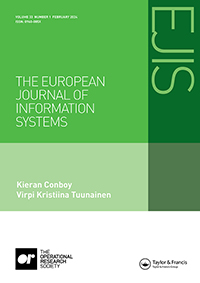建立社交商务模式:基于消费者的双重角色,利用社交媒体工具提高电子商务的效率
IF 8.6
2区 管理学
Q1 COMPUTER SCIENCE, INFORMATION SYSTEMS
引用次数: 0
摘要
摘要 社交媒体已融入传统电子商务,创造了一种以技术为基础的创新方法来改变商业实践和服务,但很少有研究人员试图了解这种方法如何改变消费者的决策和购买行为。结合期望-确认理论、期望-确认模型和信息系统连续性,我们提出了一个社交商务模型,从消费者的角度说明了社交媒体在网上购物中是如何被利用为一个三重过程(购买前、购买和购买后阶段)的。该模型包括三个阶段:社交商务动机、社交商务采用和电子商务效果。通过两轮调查,我们发现:(1) 自主动机和受控动机对社交商务信息搜寻和分享有积极影响;(2) 社交商务信息搜寻形成了消费者的购买前决策,从而影响其购买后阶段的实际购买结果、再购意向和社交商务信息分享意向。此外,我们的研究还表明,消费者在社交商务中可能扮演双重角色:购买前阶段的信息寻求者和购买后阶段的信息提供者。我们的研究结果对文献和实践具有重要意义。本文章由计算机程序翻译,如有差异,请以英文原文为准。
Towards a model of social commerce: improving the effectiveness of e-commerce through leveraging social media tools based on consumers’ dual roles
ABSTRACT Social media has been integrated into traditional e-commerce, creating an innovative technology-based approach to changing business practice and service, yet few researchers have attempted to provide an understanding of how this approach is changing consumer decision-making and purchase behaviours. Combining the expectation-confirmation theory and the expectation-confirmation model and information systems continuance, we propose a model for social commerce, illustrating how social media is utilised in online shopping as a three-fold process (pre-purchase, purchase, and post-purchase stages) from a consumer perspective. The model consists of three phases: social commerce motivation, social commerce adoption, and e-commerce effectiveness. Using two rounds of surveys, we find that (1) autonomous motivation and controlled motivation have positive effects on social commerce information seeking and sharing, and (2) social commerce information seeking formulates consumers’ pre-purchase decisions, thus affecting their actual purchase outcomes, repurchase intentions, and social commerce information-sharing intentions in the post-purchase stage. In addition, our study indicates that consumers may play dual roles in social commerce: as information seekers in the pre-purchase stage and as information providers in the post-purchase stage. Our findings have important implications for literature and practice.
求助全文
通过发布文献求助,成功后即可免费获取论文全文。
去求助
来源期刊

European Journal of Information Systems
工程技术-计算机:信息系统
CiteScore
23.10
自引率
4.20%
发文量
52
审稿时长
>12 weeks
期刊介绍:
The European Journal of Information Systems offers a unique European perspective on the theory and practice of information systems for a global readership. We actively seek first-rate articles that offer a critical examination of information technology, covering its effects, development, implementation, strategy, management, and policy.
 求助内容:
求助内容: 应助结果提醒方式:
应助结果提醒方式:


